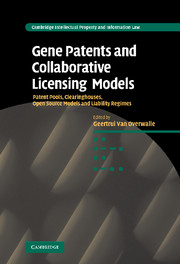 Gene Patents and Collaborative Licensing Models
Gene Patents and Collaborative Licensing Models Book contents
- Frontmatter
- Contents
- List of contributors
- Preface
- Foreword: Jean-Jacques Cassiman
- List of abbreviations
- Part I Patent pools
- Part II Clearinghouses
- Part III Open source models
- Part IV Liability regimes
- Part V Different perspectives
- 20 Gene patents: from discovery to invention. A geneticist's view
- 21 ‘Patent tsunami’ in the field of genetic diagnostics. A patent practitioner's view
- 22 Gene patents and clearing models. Some comments from a competition law perspective
- 23 Access to genetic patents and clearing models. An economic perspective
- 24 The role of law, institutions and governance in facilitating access to the scientific research commons. A philosopher's perspective
- Part VI Summary and concluding analysis
- Index
- Titles in the series
24 - The role of law, institutions and governance in facilitating access to the scientific research commons. A philosopher's perspective
from Part V - Different perspectives
Published online by Cambridge University Press: 14 January 2010
- Frontmatter
- Contents
- List of contributors
- Preface
- Foreword: Jean-Jacques Cassiman
- List of abbreviations
- Part I Patent pools
- Part II Clearinghouses
- Part III Open source models
- Part IV Liability regimes
- Part V Different perspectives
- 20 Gene patents: from discovery to invention. A geneticist's view
- 21 ‘Patent tsunami’ in the field of genetic diagnostics. A patent practitioner's view
- 22 Gene patents and clearing models. Some comments from a competition law perspective
- 23 Access to genetic patents and clearing models. An economic perspective
- 24 The role of law, institutions and governance in facilitating access to the scientific research commons. A philosopher's perspective
- Part VI Summary and concluding analysis
- Index
- Titles in the series
Summary
Introduction
Innovation in the life sciences depends on how much information is produced as well as how widely and easily it is shared. As shown by the contributions in this volume, policies governing the science commons – or alternative, more restricted information spaces – determine how widely and quickly information and research tools are distributed. The purpose of this chapter is to highlight why the science commons matters, and to analyse its organization. The concern for the governance of the science commons has caught the attention of a wide range of scholars in the mid 1990s, especially in legal scholarship. The interest of these scholars is in the cooperative use of scientific data, information, materials and research tools that actually are not in the public domain, and whose licensed use is legally protected by an intellectual property (IP) regime. In its more general meaning however, the “commons” designates any resource shared by a group of people that is subject to problems of underprovision or overconsumption of the shared resource, independently of its legal nature. From this general perspective, the scientific research commons, which we will call hereafter shortly the science commons, designates the scientific data, information and materials which are shared under conditions of non-exclusive use (though perhaps limited in its extent or use, depending on the collective agreements) within limited or global research communities.
- Type
- Chapter
- Information
- Gene Patents and Collaborative Licensing ModelsPatent Pools, Clearinghouses, Open Source Models and Liability Regimes, pp. 365 - 380Publisher: Cambridge University PressPrint publication year: 2009
- 2
- Cited by


